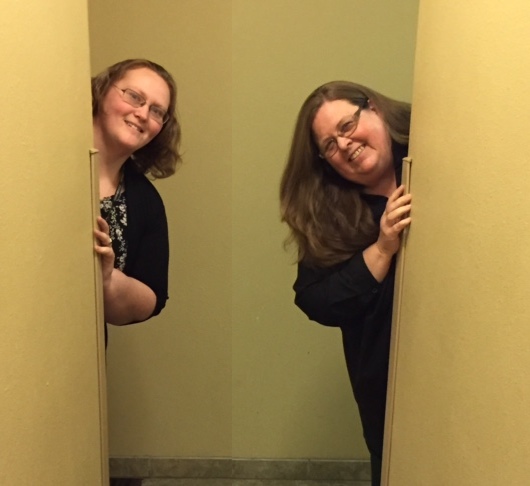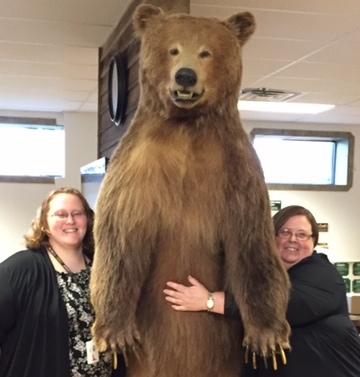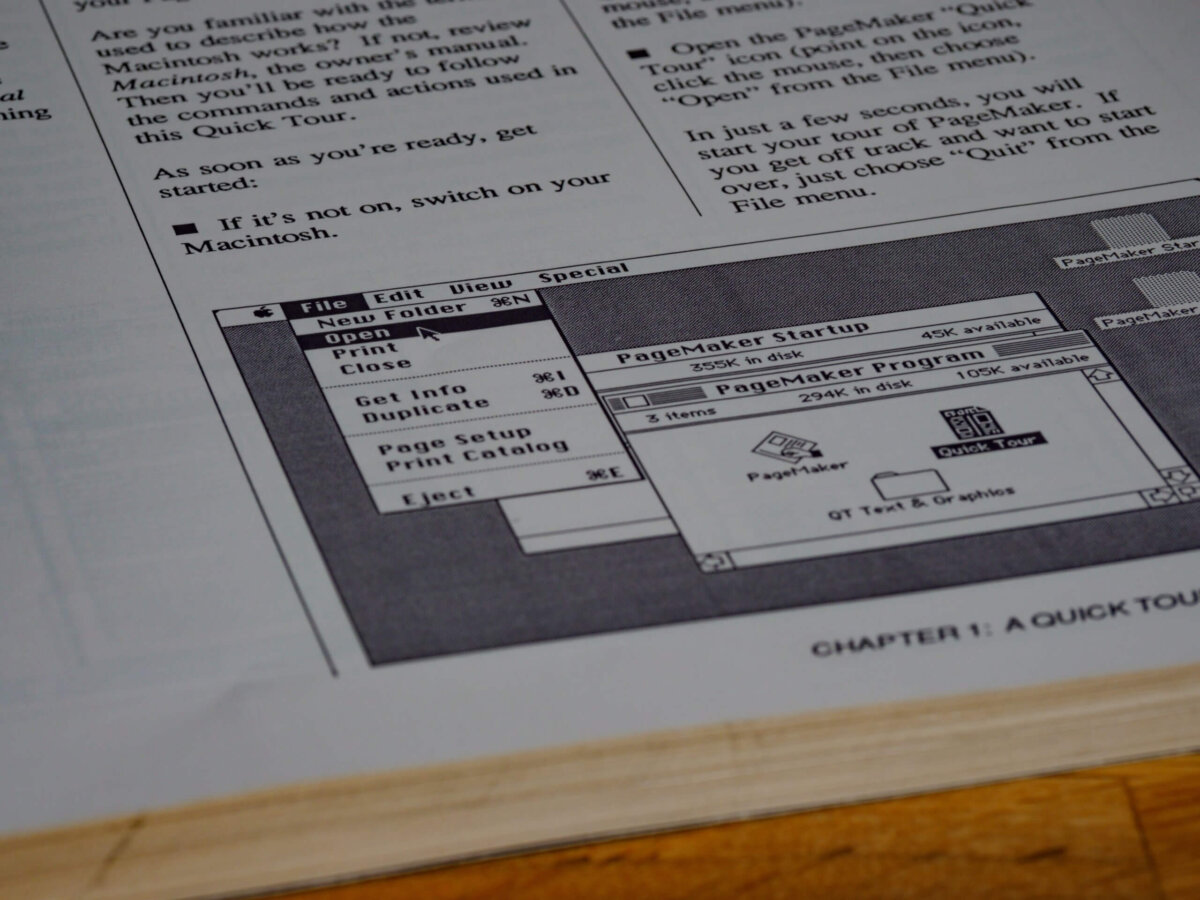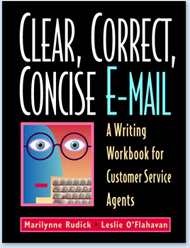 In this blog, I often comment on the best (and worst) ways to write email to customers. Today, I’m honored to feature two excellent, productive customer service agents who do this important work. Heidi Ossian (on the left) and Betty Nielsen (on the right) work for the hunting, fishing, and camping retailer Cabela’s. Heidi’s worked for Cabela’s for 15 years and has been writing emails to customers for about 10 years. Betty’s worked for Cabela’s for 28 years and has been writing emails to customers for about 15 years.
In this blog, I often comment on the best (and worst) ways to write email to customers. Today, I’m honored to feature two excellent, productive customer service agents who do this important work. Heidi Ossian (on the left) and Betty Nielsen (on the right) work for the hunting, fishing, and camping retailer Cabela’s. Heidi’s worked for Cabela’s for 15 years and has been writing emails to customers for about 10 years. Betty’s worked for Cabela’s for 28 years and has been writing emails to customers for about 15 years.
With all the experience they’ve gained, I jumped at the chance to interview them and get their perspective on first contact resolution, the importance of correct grammar, how management can support frontline staff, and more. I’m glad to share the insights of these salt-of-the-earth, customer-loving email-writing pros. At the end of the interview, you can read their managers’ kind words about Betty and Heidi. And don’t miss the picture of the grizzly bear!
Were you a good writer when you were in high school or college?
- Heidi: “Yes, I was a pretty good writer. I’ve got a Journalism degree, with a concentration in Creative Writing. I also write poetry and short stories occasionally.”
- Betty: “No. English was my worst subject and my least favorite. I hated writing, but I took several writing courses in college. After college, through the different companies I worked for, writing just started coming a little more naturally to me.”
Do you think a successful customer service agent needs to love to write?
- Betty: “I’d say no, as long as you can actually connect to your customer. I just try to write the way I sound like I’m talking to you right now.”
Do you prefer being an email agent to being a phone agent?
- Heidi: “Yes. I am more fluent in the written word. There’s more room for thought. I tend to get a little tongue-tied some days.”
- Betty: “I prefer being an e-mail agent because it allows me time to respond to the customer appropriately and give them all their options.”
What do you think is the most important writing skill an email customer service agent must have?
- Heidi: “Listening … or in the written world, reading.”
- Betty: “I want each of my customers to feel they are the most important person at that moment, and I will do everything I can to assist them. It makes customers happy and my job easier.”
How important is correct spelling, punctuation, and grammar to the work you do?
- Heidi: “Extremely. A well-written email is professional, a representation of the company and you. It is also crucial with international customers. Incorrect spelling or grammar can make translations difficult.”
- Betty: “I represent Cabela’s. If the spelling, punctuation or grammar are not correct, it does not give a good impression of Cabela’s. That’s what the customer sees.”
Your manager told me that both of you are incredibly productive email writers. What makes you so productive?
- Betty: “We have a lot of repetition from customers. Several customers are asking the same question, so I can use a prewritten message for them. For each customer I have to tweak it a bit, of course, because I like to make it personal. But if I have the general format written out so I can copy and paste, that’s what makes it easiest for me. Also, I know how to find answers to their questions on our website or in our manual. The longer you’re with the company and know those things, that makes you faster, and I’ve been with Cabela’s for 28 years!”
- Heidi: “When used correctly, I think templates are great. But I don’t want to be a machine that uses prewritten content constantly. The templates need to be used appropriately.”
Is there anything Cabela’s management could do that would empower you to write better email?
- Heidi: “They’ve already done something that has actually helped me do email a lot better. At one time, we had limited web access; many sites were blocked. But sometimes, in their emails, customers would use unfamiliar words or an unusual turn of phrase or ask about an event that I just didn’t know about. Now that web access isn’t limited like it was, I can Google the event or use an online dictionary to look up a word. That’s been a tremendous help. The company trusts me to go to the sites that I feel I need to go to to help my customers. Another thing management does is retrain me because things are always changing. I’m a firm believer that if something changes, we need to make sure everybody’s trained on it. And share information with me. If there’s a way of writing or a way of thinking, even just a blog that says ’10 Successful Tips on Customer Service’ just bring it to my attention. That is helpful.”
- Betty: “I have to agree with Heidi about the training. Things change so much with a mail order company especially. Even though I may have been trained five years ago, it’s nice to be retrained so everybody’s on the same page. That’s my biggest thing. Make sure that we’re all together; we’re all working the same way.”
Do you work unconventional hours?
- Betty: “I come in at midnight and go home at 8:30 am. During Christmas or peak season, I come in as early as 10 pm. I like the overnight shift. It’s quiet, and I’m a night owl.”
- Heidi: “I work some of the strange hours too. For example, this is my last week of working from 2 am to 10:30 am. Next week I’ll star working from midnight until 8:30 am. I like the night hours. My husband works nights also, so we’ve kind of got our days and nights switched around. Throughout my the years at Cabela’s, I’ve probably worked every shift there is! As long as they’ll let me work these hours, I’ll keep working them.”
When you write an email to a customer, which is your priority? First contact resolution or building a relationship with the customer?
- Heidi: “That’s kind of a tough question. I like to do both, especially if it’s a new customer who’s maybe placed one order with us. If they have an issue or a question, we want to get everything resolved in that one contact. But we also try and build a relationship, so if it’s a negative experience we can turn it into a positive resolution, so they’ll keep coming back to us.”
What don’t other people — friends, family, colleagues — understand about your job as an email customer service agent?
- Betty: “Many of them just don’t understand that you can actually take care of your customer with an email. You don’t have to physically talk to them. If I have a customer that needs to return something, I can take care of him in an email. I don’t have to call him to make it a great customer service experience.”
- Heidi: “I like Betty’s answer. Here’s what I can add. I’ve worked emails long enough that I know where to find information and put it in my email to prevent having to write back to a customer repeatedly. People need a lot of experience to help the customer at the first point of email contact, if that makes sense. If people don’t know the ins and outs of the systems we work with or haven’t had enough experience, it’s harder to write the emails.”
What difference do you see between veteran customer service writers and junior staff?
- Betty and Heidi: “The new e-mailers are learning to spread their wings. Most have the skills but not the confidence. Confidence comes with more years of service. They are still trying to figure out what works and doesn’t. You can tell once they find their voice as their e-mails flow better.”
Would you recommend to others that they become email customer service agents?
- Betty: “I would! I believe it’s a great job. Then again, you have to be a certain type of person to be able to do this too. You have to have the right personality. You need a certain type of mindset. I think it’s great; I think email is a wonderful way to communicate with our customers.”
- Heidi: “I have to agree. I would recommend it too. I agree with Betty that it takes a certain type of mindset. You’ve got to make sure you’re conversational with the customer in the email and not too brusque or too demanding.”
.
 Managers trust and rely on Betty and Heidi
Managers trust and rely on Betty and Heidi
Truly, it’s a love fest. Here’s what Todd Hixson, Cabela’s Contact Center Workforce Manager, says: “Why are Betty and Heidi so great? Heidi embraces omnichannel with a passion, understanding that customers want their channel of choice. She wants to produce a stellar customer experience in each channel. And Betty is not afraid to push the envelope. She’s an ambassador for change, if change helps her customers. On top of that, Betty is an overtime machine who ‘slays the queue’ even when backlogs pile up.”
Kim Madison, Contact Center Supervisor, chimes in: “Betty and Heidi have a combined 43 years of service with Cabela’s and 25 years of experience with emailing customers. They are passionate about providing the legendary service our customers have experienced since 1961. They take great pride in researching customer situations thoroughly and responding to their customers with care and empathy. These two ladies are very reliable; this is one of the reasons we chose them to handle our emails overnight. We knew we could depend on them to not only be here, but to take the initiative to handle the email volumes without supervision.”
Tags: Customer service, Customer service e-mail







I will be back here